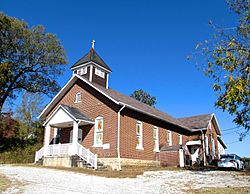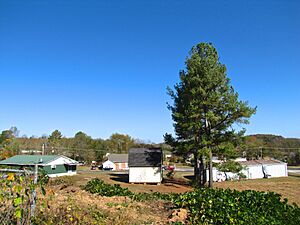Iron City, Tennessee facts for kids
Quick facts for kids
Iron City, Tennessee
|
|
|---|---|

South Lawrence Head Start in Iron City
|
|

Location of Iron City, Tennessee
|
|
| Country | United States |
| State | Tennessee |
| Counties | Lawrence, Wayne |
| Area | |
| • Total | 0.69 sq mi (1.79 km2) |
| • Land | 0.69 sq mi (1.79 km2) |
| • Water | 0.00 sq mi (0.00 km2) |
| Elevation | 564 ft (172 m) |
| Population
(2020)
|
|
| • Total | 274 |
| • Density | 396.53/sq mi (153.14/km2) |
| Time zone | UTC-6 (Central (CST)) |
| • Summer (DST) | UTC-5 (CDT) |
| ZIP code |
38463
|
| Area code(s) | 931 |
| FIPS code | 47-37360 |
| GNIS feature ID | 1289045 |
Iron City is a small community in Tennessee. It is located in both Lawrence and Wayne counties. It is known as a census-designated place, which means it is an area identified by the government for counting people. It does not have its own local government right now.
Iron City used to be an official city for many years. It was incorporated, or made into a city, from 1887 to 1901. Then, it became a city again from 1962 until 2010. In 2010, the people living there voted to stop being an official city. In 2020, about 274 people lived in Iron City.
Contents
History of Iron City
Iron City got its name because of an old iron factory that used to operate nearby in the late 1800s. People started mining iron ore in this part of Tennessee as early as the 1830s. The iron business really grew in 1886. This was when a special railroad line was built to the area.
Iron City became an official city the very next year, in 1887. When the iron industry was at its busiest, Iron City had about 1,000 people living there. It also had two hotels and two banks.
Geography and Location
Iron City is located in the Shoal Creek Valley. This is just north of the border between Tennessee and Alabama. The community is surrounded by rugged hills to the north, south, and west. The Shoal Creek runs along its eastern side.
Roads and Connections
State Route 227 goes through Iron City from east to west. This road connects Iron City to St. Joseph to the east. It also connects to State Route 13 to the west. State Route 13 is south of Collinwood.
Another road, State Route 242, meets State Route 227 in Iron City. This road connects the community to Westpoint and Lawrenceburg to the northeast. Poplar Street, also called Pruitton Road, connects Iron City to Lauderdale County, Alabama, to the south. It becomes County Road 61 when it crosses the state line.
The United States Census Bureau says that Iron City covers about 0.9 square miles (2.4 square kilometers). All of this area is land.
People of Iron City
In 2000, there were 368 people living in Iron City. There were 151 households, which are groups of people living together in one home. Most of the people living in Iron City were white. A small number were African American or from other backgrounds.
The average age of people in Iron City in 2000 was 36 years old. About a quarter of the population was under 18 years old.
In 2010, the population was 328 people. By 2020, the population was 274 people.
Notable People
Iron City is the hometown of Melba Montgomery. She was a popular country music singer in the 1960s.
See also
 In Spanish: Iron City (Tennessee) para niños
In Spanish: Iron City (Tennessee) para niños
 | John T. Biggers |
 | Thomas Blackshear |
 | Mark Bradford |
 | Beverly Buchanan |


